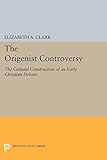The Origenist Controversy : The Cultural Construction of an Early Christian Debate / Elizabeth A. Clark.
Material type: TextSeries: Princeton Legacy Library ; 146Publisher: Princeton, NJ : Princeton University Press, [2014]Copyright date: ©1992Edition: Course BookDescription: 1 online resource (300 p.)Content type:
TextSeries: Princeton Legacy Library ; 146Publisher: Princeton, NJ : Princeton University Press, [2014]Copyright date: ©1992Edition: Course BookDescription: 1 online resource (300 p.)Content type: - 9780691603513
- 9781400863112
- Christian heresies -- History -- Early church, ca. 30-600
- Christian sociology -- History -- Early church, ca. 30-600
- RELIGION / History
- Ambrosiaster
- Anathema
- Anchorite
- Apologetics
- Apologeticus
- Apostasy
- Arian controversy
- Arianism
- Arius
- Asceticism
- Backsliding
- Basil of Caesarea
- Blasphemy
- Book of Judges
- Books of Kings
- Caelestius
- Celibacy
- Church Fathers
- Consubstantiality
- Council of Ephesus
- Criticism of Christianity
- Damnatio memoriae
- Damnation
- De fide
- Dogma
- Donatism
- Ecclesiastical jurisdiction
- Elijah
- Epistle to the Ephesians
- Evagrius Ponticus
- Excommunication
- Exegesis
- Exorcism
- Ezekiel
- Fall of man
- False prophet
- Fear of God
- Gluttony
- God
- Golden calf
- Good and evil
- Heresiarch
- Heresy
- Heterodoxy
- Homoiousian
- Iconoclasm
- Idolatry
- Image of God
- Jacob and Esau
- John Chrysostom
- John of Jerusalem
- Jovinian
- Justification (theology)
- Macarius
- Manichaeism
- Marcion of Sinope
- Marcionism
- Matthew 25
- Maximilla
- Melania the Elder
- Metempsychosis
- Monophysitism
- Montanism
- Natural evil
- Nomina sacra
- Origen
- Outer darkness
- Paganism
- Panarion
- Paschal
- Paul of Samosata
- Paulinus of Nola
- Pelagianism
- Pelagians (Quietism)
- Polemic
- Predestination
- Priscillian
- Priscillianism
- Psalm 1
- Religion
- Renunciation
- Sabellianism
- Sexual Desire (book)
- Simon Magus
- Sin
- Spiritual body
- Spirituality
- Subordinationism
- Superiority (short story)
- Susanna (Book of Daniel)
- The City of God (book)
- The Righteous Men
- The Sheep and the Goats
- Theodicy
- Theodore of Mopsuestia
- Theodosius I
- Theology
- Treatise on the Resurrection
- Vigilantius
- Wickedness
- 273.4
- BR203 .C57 1992
- online - DeGruyter
| Item type | Current library | Call number | URL | Status | Notes | Barcode | |
|---|---|---|---|---|---|---|---|
 eBook
eBook
|
Biblioteca "Angelicum" Pont. Univ. S.Tommaso d'Aquino Nuvola online | online - DeGruyter (Browse shelf(Opens below)) | Online access | Not for loan (Accesso limitato) | Accesso per gli utenti autorizzati / Access for authorized users | (dgr)9781400863112 |
Frontmatter -- CONTENTS -- Acknowledgments -- List of Abbreviations -- INTRODUCTION -- CHAPTER ONE. Elite Networks and Heresy Accusations: Towards a Social Description of the Origenist Controversy -- CHAPTER TWO. Image and Images: Evagrius Ponticus and the Anthropomorphite Controversy -- CHAPTER THREE. The Charges against Origenism -- CHAPTER FOUR. Rufinus’s Defense against Charges of Origenism -- CHAPTER FIVE. From Origenism to Peiagianism -- CONCLUSION -- AFTERWORD -- Bibliography -- Index
restricted access online access with authorization star
http://purl.org/coar/access_right/c_16ec
Around the turn of the fifth century, Christian theologians and churchmen contested each other's orthodoxy and good repute by hurling charges of "Origenism" at their opponents. And although orthodoxy was more narrowly defined by that era than during Origen's lifetime in the third century, his speculative, Platonizing theology was not the only issue at stake in the Origenist controversy: "Origen" became a code word for nontheological complaints as well. Elizabeth Clark explores the theological and extra-theological implications of the dispute, uses social network analysis to explain the personal alliances and enmities of its participants, and suggests how it prefigured modern concerns with the status of representation, the social construction of the body, and praxis vis--vis theory. Shaped by the Trinitarian and ascetic debates, and later to influence clashes between Augustine and the Pelagians, the Origenist controversy intersected with patristic campaigns against pagan "idolatry" and Manichean and astrological determinism. Discussing Evagrius Ponticus, Epiphanius, Theophilus, Jerome, Shenute, and Rufinus in turn, Clark concludes by showing how Augustine's theory of original sin reconstructed the Origenist theory of the soul's pre-existence and "fall" into the body.Originally published in 1992.The Princeton Legacy Library uses the latest print-on-demand technology to again make available previously out-of-print books from the distinguished backlist of Princeton University Press. These editions preserve the original texts of these important books while presenting them in durable paperback and hardcover editions. The goal of the Princeton Legacy Library is to vastly increase access to the rich scholarly heritage found in the thousands of books published by Princeton University Press since its founding in 1905.
Mode of access: Internet via World Wide Web.
In English.
Description based on online resource; title from PDF title page (publisher's Web site, viewed 27. Jan 2023)


